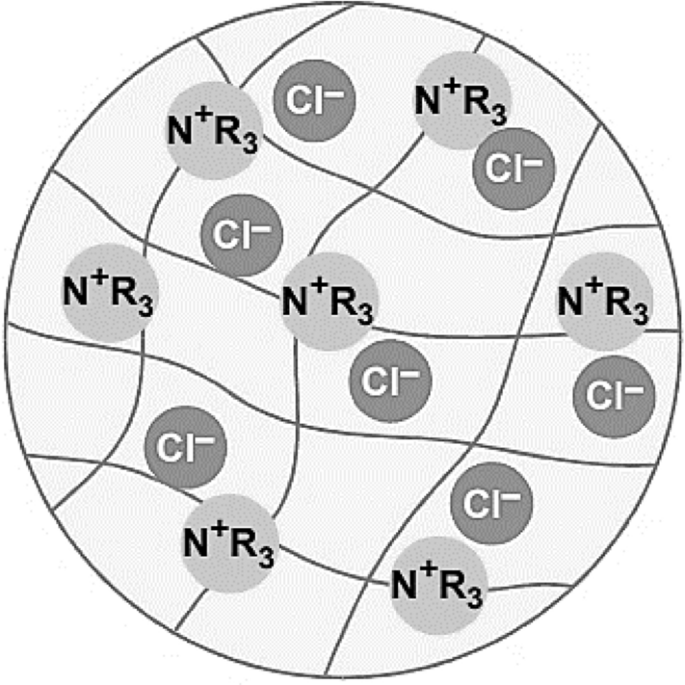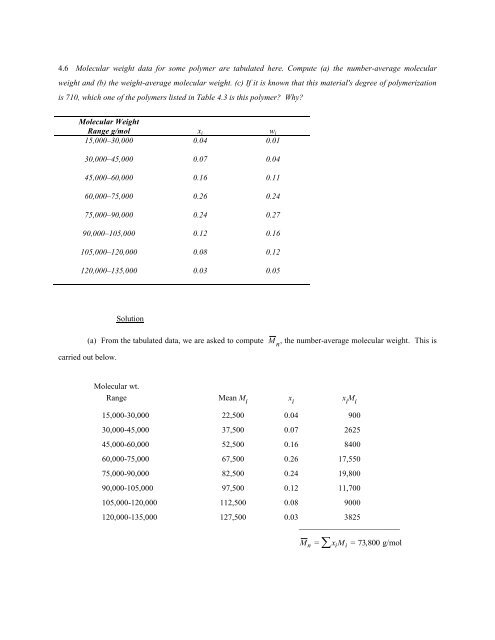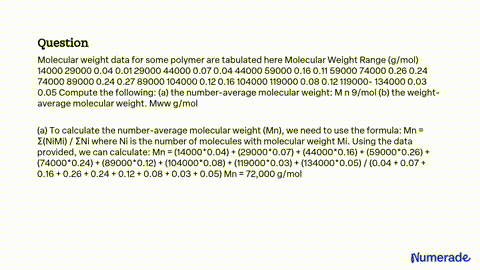Assignment 3 for BREE 216 problems chapter molecular weight data for some polymer are tabulated here. compute the following: the molecular weight the molecular. Skip to document. Ask an Expert. … Molecular weight data for som e polymer are tabulated here. C ompute the following: (a)
Bif401 Highlighted Subjective Handouts by BINT – E – HAWA | PDF | Sequence Alignment | Rna
Molecular weight data for some polymer are tabulated here. Compute the following: (a) the number-average molecular weight (b) the weight-average molecular weight. (c) If it is known that this material’s degree of polymerization is 477, which one of the polymers listed in Table 14.3 is this polymer? Why?
Source Image: f4news.com
Download Image
Molecular weight data for some polymer are tabulated here. Compute (a) the number average molecular weight, and (b) the weight-average molecular weight. (c) If it is known that this material’s degree of polymerization is 477, which one of the polymers listed in Table 14.3 is this polymer? Why?
Source Image: opensea.io
Download Image
PHR1022 Chemistry Notes | PHR1022 – How Medicines Work ll – Monash | Thinkswap
Question Molecular weight data for some polymer are tabulated here. Compute the following: (a) the number-average molecular weight. (b) the weight-average molecular weight. (c) If it is known that this material’s degree of polymerization is 477, which one of the polymers listed in the table is this polymer? Why?

Source Image: bioresourcesbioprocessing.springeropen.com
Download Image
Molecular Weight Data For Some Polymer Are Tabulated Here.
Question Molecular weight data for some polymer are tabulated here. Compute the following: (a) the number-average molecular weight. (b) the weight-average molecular weight. (c) If it is known that this material’s degree of polymerization is 477, which one of the polymers listed in the table is this polymer? Why?
Molecular weight data for some polymer are tabulated here. Compute (a) the number average molecular weight, and (b) the weight-average molecular weight. (c) If it is known that this material’s degree of polymerization is 477, 477, which one of the polymers listed in Table 14.3 is this polymer? Why?
Lactic acid separation and recovery from fermentation broth by ion-exchange resin: A review | Bioresources and Bioprocessing | Full Text
Molecular Weight 14.2 Compute repeat unit molecular weights for the following: (a) poly (vinyl chloride), (b) poly (ethylene terephthalate), (c) polycarbonate, and (d) polydimethylsiloxane. Solution (a) For poly (vinyl chloride), each repeat unit consists of two carbons, three hydrogens, and one chlorine (Table 14.3).
e-journal – May-Jun ’22 by TheTextile Association (India) – Issuu

Source Image: issuu.com
Download Image
HW5 solution
Molecular Weight 14.2 Compute repeat unit molecular weights for the following: (a) poly (vinyl chloride), (b) poly (ethylene terephthalate), (c) polycarbonate, and (d) polydimethylsiloxane. Solution (a) For poly (vinyl chloride), each repeat unit consists of two carbons, three hydrogens, and one chlorine (Table 14.3).

Source Image: yumpu.com
Download Image
Bif401 Highlighted Subjective Handouts by BINT – E – HAWA | PDF | Sequence Alignment | Rna
Assignment 3 for BREE 216 problems chapter molecular weight data for some polymer are tabulated here. compute the following: the molecular weight the molecular. Skip to document. Ask an Expert. … Molecular weight data for som e polymer are tabulated here. C ompute the following: (a)

Source Image: scribd.com
Download Image
PHR1022 Chemistry Notes | PHR1022 – How Medicines Work ll – Monash | Thinkswap
Molecular weight data for some polymer are tabulated here. Compute (a) the number average molecular weight, and (b) the weight-average molecular weight. (c) If it is known that this material’s degree of polymerization is 477, which one of the polymers listed in Table 14.3 is this polymer? Why?

Source Image: thinkswap.com
Download Image
SOLVED: Molecular weight data for some polymer are tabulated here: Molecular Weight Range (g/mol) 10000 – 25000 0.04 0.01 25000-40000 0.07 0.04 40000 – 55000 0.16 0.11 55000-70000 0.26 0.24 70000- 85000
In polymer chemistry, the width of the distribution of molecular weights is described by the dispersity (Ð, also called, in older texts, the polydispersity or the polydispersity index, PDI). The dispersity of a polymer sample if often between 1 and 2 (although it can be even higher than 2). The closer it is to 1, the narrower the distribution.

Source Image: numerade.com
Download Image
QSPR-QSAR Studies on Desired Properties for Drug Design by Research Signpost – Issuu
Question Molecular weight data for some polymer are tabulated here. Compute the following: (a) the number-average molecular weight. (b) the weight-average molecular weight. (c) If it is known that this material’s degree of polymerization is 477, which one of the polymers listed in the table is this polymer? Why?

Source Image: issuu.com
Download Image
GuacaMol: Benchmarking Models for de Novo Molecular Design | Journal of Chemical Information and Modeling
Molecular weight data for some polymer are tabulated here. Compute (a) the number average molecular weight, and (b) the weight-average molecular weight. (c) If it is known that this material’s degree of polymerization is 477, 477, which one of the polymers listed in Table 14.3 is this polymer? Why?

Source Image: pubs.acs.org
Download Image
HW5 solution
GuacaMol: Benchmarking Models for de Novo Molecular Design | Journal of Chemical Information and Modeling
Molecular weight data for some polymer are tabulated here. Compute the following: (a) the number-average molecular weight (b) the weight-average molecular weight. (c) If it is known that this material’s degree of polymerization is 477, which one of the polymers listed in Table 14.3 is this polymer? Why?
PHR1022 Chemistry Notes | PHR1022 – How Medicines Work ll – Monash | Thinkswap QSPR-QSAR Studies on Desired Properties for Drug Design by Research Signpost – Issuu
In polymer chemistry, the width of the distribution of molecular weights is described by the dispersity (Ð, also called, in older texts, the polydispersity or the polydispersity index, PDI). The dispersity of a polymer sample if often between 1 and 2 (although it can be even higher than 2). The closer it is to 1, the narrower the distribution.